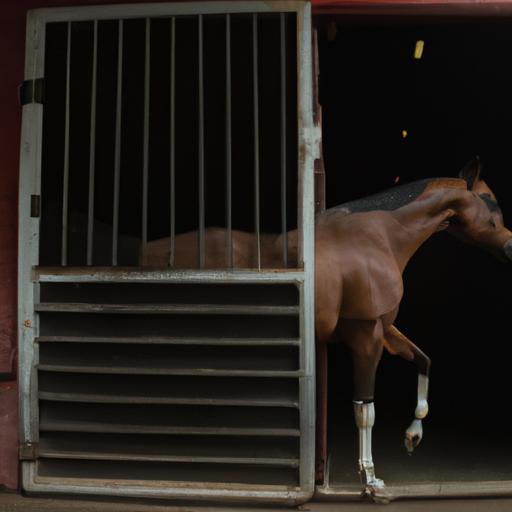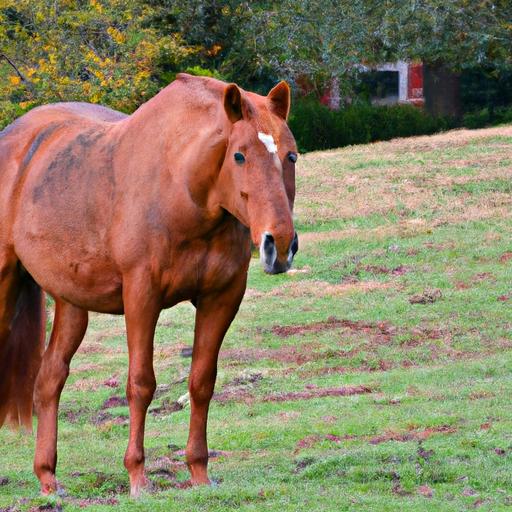Discover effective strategies to prevent and alleviate bored horse behavior. From enrichment activities to social interaction, find ways to keep your horse engaged and happy.
Introduction

In the world of equestrian care, it is crucial to recognize the signs and symptoms of various equine behaviors. One such behavior that deserves our attention is “bored horse behavior.” But what exactly does this term entail? Let’s dive into the definition and explore the significance of addressing boredom in horses.
Definition of Bored Horse Behavior
Boredom in horses refers to a state of restlessness and discontentment resulting from insufficient mental and physical stimulation. Just like humans, horses are intelligent and social beings that thrive in engaging environments. When deprived of mental challenges, social interactions, or a dynamic routine, they are prone to exhibit signs of boredom.
Importance of Addressing Boredom in Horses
Now, you might wonder, why should we prioritize combating boredom in our equine companions? Well, the answer lies in the detrimental effects it can have on their overall well-being. Boredom not only affects their mental health but also impacts their physical condition and performance.
A bored horse may display a lack of interest in their surroundings, engage in repetitive behaviors or stereotypies, experience a decrease in appetite or weight loss, or even exhibit aggressive or destructive tendencies. These behaviors not only indicate their dissatisfaction but also pose risks to their safety and the general harmony within their living environment.
By understanding and addressing boredom in horses, we can enhance their quality of life, promote their mental and physical health, and foster a stronger bond between horse and handler. So, let’s delve deeper into the signs, causes, and strategies to prevent and alleviate boredom in our beloved equines.
Stay tuned for the upcoming sections where we will explore the signs and symptoms of boredom in horses, the underlying causes, and effective strategies to combat this issue head-on. Together, let’s create a stimulating environment that keeps our horses engaged, happy, and thriving.
Signs and Symptoms of Boredom in Horses
Boredom in horses manifests itself through various signs and symptoms that can serve as valuable indicators for horse owners and caretakers. By recognizing these signs early on, we can take proactive measures to address and alleviate the underlying boredom. Let’s explore some common signs and symptoms.
Lack of Interest in Surroundings
One prominent sign of boredom in horses is a noticeable lack of interest in their surroundings. They may appear disengaged, unresponsive, and exhibit a general apathy towards their environment. This disinterest can be observed during feeding, turnout, or when interacting with other horses or humans. If your horse seems unenthused or indifferent, it might be a clear indication of boredom.
Repetitive Behaviors or Stereotypies
Horses suffering from boredom often resort to repetitive behaviors or stereotypies as a coping mechanism. These behaviors serve as an outlet for their frustration and can include actions such as cribbing, weaving, pawing, or head-bobbing. If you notice your horse engaging in these repetitive actions excessively, it is crucial to address the underlying boredom to prevent the development of harmful habits.
Decreased Appetite or Weight Loss
Boredom can also manifest in horses through changes in their eating habits. A bored horse may exhibit a decreased appetite or even experience weight loss over time. If your horse is showing a lack of enthusiasm during meal times or has experienced a noticeable decline in body condition, it is essential to investigate whether boredom might be a contributing factor.
Aggressive or Destructive Behavior
In some cases, boredom can lead to the emergence of aggressive or destructive behavior in horses. They may become irritable, exhibit biting or kicking tendencies towards other horses or humans, or engage in destructive behaviors such as chewing on fences or stall doors. These aggressive and destructive actions not only jeopardize the safety of those around them but also indicate a deep-seated frustration resulting from boredom.
By being vigilant and observant of these signs and symptoms, you can take the necessary steps to address boredom in your horse. In the upcoming sections, we will explore the underlying causes of boredom and effective strategies to prevent and alleviate this issue, ensuring the overall well-being and happiness of our equine companions.
Causes of Boredom in Horses
A. Insufficient Mental Stimulation
Horses possess remarkable cognitive abilities and a natural curiosity that should be nurtured. When they lack mental stimulation, their minds can become idle and bored. This often occurs when they are confined to a monotonous environment without opportunities for exploration or mental challenges. Imagine being confined to a room with no books, toys, or any form of mental stimulation. It wouldn’t take long before boredom sets in, right? Horses are no different. They need mental engagement to thrive.
B. Lack of Social Interaction
Horses are highly social animals, and their well-being is heavily influenced by their interactions with other horses. When they are deprived of social contact, boredom can quickly take hold. In a natural herd setting, horses engage in various social behaviors such as grooming, playing, and establishing hierarchies. These interactions provide mental and emotional stimulation. However, when horses are isolated or have limited interaction with companions, they may become bored and frustrated.
C. Monotonous Environment or Routine
Imagine living in a place where everything remains the same day after day – the same sights, sounds, and activities. It wouldn’t take long before monotony sets in, leading to boredom. Horses need a dynamic environment that offers variety and new experiences to keep their minds engaged. A lack of diversity in their surroundings, such as a small paddock or a confined stable, can quickly lead to boredom.
D. Inadequate Exercise or Turnout Time
Horses are natural athletes and require regular exercise and turnout to maintain their physical and mental well-being. When horses don’t receive enough exercise or turnout time, they can become restless and bored. Imagine being cooped up indoors for days without any opportunity to stretch your legs or enjoy the outdoors. It would undoubtedly lead to frustration and boredom. Horses need the freedom to move, graze, and engage in natural behaviors to prevent boredom from taking hold.
By recognizing these underlying causes of boredom in horses, we can take proactive steps to address them. In the following section, we will explore the negative effects of boredom on horses, shedding light on why it’s crucial to combat this issue.
Negative Effects of Boredom on Horses
Boredom in horses isn’t merely a passing phase; it can have profound and far-reaching consequences for their well-being. Let’s delve into the negative effects that boredom can have on these majestic creatures, ranging from physical health issues to behavioral problems and diminished performance and engagement.
A. Physical Health Issues
When horses become bored, their physical health can suffer. One common outcome is weight loss or a decrease in appetite. Horses that lack mental stimulation and are confined to a monotonous environment may lose interest in their feed, leading to nutritional deficiencies and a decline in overall body condition. Additionally, the lack of mental and physical activity can contribute to muscle atrophy, stiffness, and reduced flexibility, potentially leading to musculoskeletal issues.
B. Behavioral Problems
Boredom often manifests in horses through the development of behavioral problems. Repetitive behaviors or stereotypies, such as cribbing, weaving, or pawing, are common signs of a bored horse seeking self-soothing mechanisms. These behaviors not only indicate their frustration but can also result in physical harm, such as dental problems or hoof damage. Furthermore, a bored horse may become irritable, aggressive, or display destructive behavior towards their surroundings or herd mates, leading to potential injuries and disrupted social dynamics.
C. Reduced Performance and Engagement
A horse that is bored and disengaged is unlikely to perform at its full potential. Whether in competitive disciplines or recreational riding, boredom can hinder their willingness to cooperate, learn, and perform tasks. The lack of mental stimulation and variety in their routine can result in a disinterested and unmotivated horse, undermining their overall engagement and hindering their ability to learn new skills or maintain focus during training sessions. Ultimately, this can impede their progress and limit the enjoyment both horse and rider derive from their activities.
Understanding the negative effects of boredom on horses is crucial in motivating us to address this issue proactively. In the upcoming sections, we will explore effective strategies to prevent and alleviate boredom, ensuring our horses lead fulfilling lives and reach their full potential. So, let’s move forward and discover the practical solutions that will transform our equine companions’ well-being.
Conclusion
In conclusion, addressing boredom in horses is of utmost importance in ensuring their overall well-being and happiness. By understanding the signs and symptoms of boredom, as well as its underlying causes, we can take proactive measures to prevent and alleviate this issue.
Boredom in horses can lead to a range of negative effects, including physical health issues, behavioral problems, and reduced performance. It is essential for horse owners and caretakers to recognize these signs and take action to provide a stimulating environment for their equine companions.
To prevent and alleviate boredom in horses, there are several strategies that can be implemented. Providing enrichment activities, such as toys, puzzles, and natural foraging opportunities, can engage their minds and keep them mentally stimulated. Increasing social interaction by allowing horses to interact with other compatible equine companions can fulfill their natural social needs.
Varying the routine and environment is another effective way to combat boredom. Introducing new experiences, such as trail rides, obstacle courses, or different training exercises, can keep horses engaged and interested. Additionally, offering sufficient exercise and turnout time allows horses to release pent-up energy and explore their surroundings, reducing the likelihood of boredom.
In conclusion, by prioritizing the prevention and alleviation of boredom in horses, we can create a harmonious and fulfilling environment for them. Remember, a happy and content horse is not only a joy to be around but also performs better in various equestrian activities.
At Horsemasterypro.com, we are committed to providing valuable insights and actionable strategies to enhance your horse’s well-being. Join us in our journey to create a vibrant and stimulating environment for our equine companions. Together, let’s ensure that boredom becomes a thing of the past for our beloved horses.


